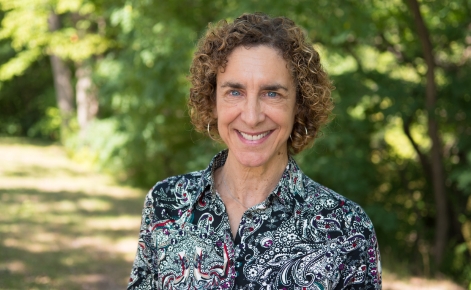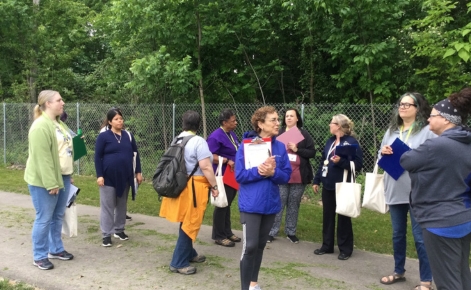Professor Gail Richmond and scholars from the Michigan State University College of Education developed an innovative approach to urban elementary science education by integrating outdoor learning into the curriculum.
“The idea is to bring educators together and help them think about how they might leverage the outdoor spaces around their buildings and neighborhoods to help kids learn in meaningful ways,” said Richmond, who serves as associate chairperson of the Department of Teacher Education and director of the Teacher Preparation Program. “We focused on using areas familiar to the students, transforming them from spaces they merely walk through into dynamic learning environments.”

Funded by an over $2,100,000 National Science Foundation (NSF) grant, the ongoing five-year project started in 2019 partnered scholars with nearly 50 educators from Lansing and Detroit, Michigan, to develop strategies for using outdoor spaces to teach science in meaningful and culturally responsive ways.
A core component of the project was addressing social justice issues.
Through previous research, Richmond and her team recognized that many urban children, particularly those from marginalized communities, often feel unwelcome or excluded from public parks, nature reserves and other outdoor environments traditionally used for education.
The team worked closely with teachers to identify and address the barriers their students faced, from the physical neglect of local parks to the broader societal biases that make these spaces feel inaccessible.
“Often, children of color do not feel welcome in spaces like nature parks or zoos. We focused on making these places feel relevant and accessible to their lives and experiences.” Richmond said. “We wanted to center our students in ways that felt relevant to their lives, ensuring that their priorities and lived experiences were considered in the educational process.”
The research team did this by working closely with teachers to integrate culturally relevant content into their outdoor lessons, and by addressing safety concerns raised by teachers.
Outdoor outcomes
Richmond’s team – including Ph.D. students Grace Tukurah and Kara Haas, Postdoctoral Research Associates Roberta Hunter and Eleanor Kenimer, senior staff person Irene Bayer, and colleague Professor Tali Tal (Technion Israel Institute of Technology) – found that teachers who engaged in the program transformed their approach to outdoor education, viewing schoolyards and local environments as rich educational resources that educators could leverage to teach science in ways that are both culturally relevant and socially just.

The scholars also found that teachers became more attuned to the social justice implications of their teaching environments, recognizing and addressing the barriers their students faced in accessing outdoor spaces, such as safety concerns, environmental neglect and societal biases.
“Going outside with them [students] always made me anxious. But I realized, after the program, that we can transform these spaces into safe and meaningful learning environments,” said one teacher who participated in the project. “Now, I tell my students, ‘You deserve a safe place to be, and we will learn to care for our learning home because we deserve this place to learn.’”
Research methods:
The study, published in Cultural Studies of Science Education, involved several types of qualitative research methods. These included:
- Field Notes: Multiple sets of field notes were collected from participant teachers during both virtual and in-person professional development sessions. These notes captured direct observations of teacher activities and interactions, as well as the researchers’ reflective impressions of these events.
- Interviews: The team conducted pre- and post-program interviews with teachers. These interviews explored teachers’ expectations, challenges, and reflections on their relationships with outdoor instructional spaces and how these evolved over the course of the program.
- Daily Reflections: Teachers were asked to complete daily written reflections during the summer session.
Since funding for the project has recently been renewed, Richmond and her team are expanding their efforts by developing additional resources and tools to support more educators in integrating outdoor learning into their science curricula and by supporting educators in taking on more leadership roles in their schools and districts.




